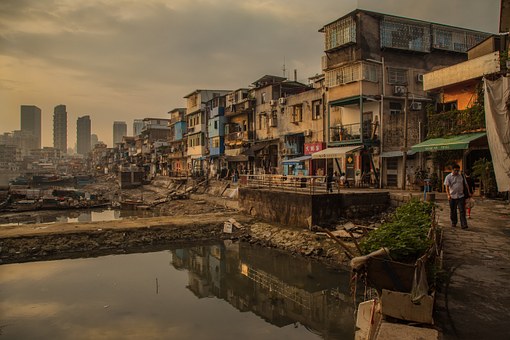
Alexandra by Wally Mongane Serote is a free-verse poem written in the first person narrative. Serote often addresses Alexandra as his mother, leading to the title of the poem. Alexandra is a black township located near Johannesburg where the poet grew up- hence throughout the poem, he is referring to the place he lived, Alexandra.
Alexandra | Summary
In the first stanza, the poet says he wishes he could tell her mother right to her face that he has seen more loving and beautiful mothers, and announce that he was going to them. If it was possible, he would have left her mother, Alexandra, many years ago. But just like how one does not choose to be born, they cannot choose or replace their mothers. Leaving one’s mother can only happen when one leaves the world. Here, he is not referring to his actual mother, but the place Alexandra where he grew up.
The poet then thinks back to the fetal stage, where he was knotted inside her mother, and likens it to now when Alexandra has knotted his life and future. He feels her throb inside him and remains silent at the sound of his heart beat. He then tells her that he’s often cried, wanting nothing more than water, but had none, and hence had to burden her by taking her breast milk. At those moments, he cries. Her breasts were dry, oozing only the dirty water of the eroding gullies- dongas- which contain the blood of his brothers and sisters who had been buried there. He demands to know whether she loves him- and if so, what is she doing to him?
The poet then tells Alexandra that she terrifies him, because she looks like she could be nasty. Even when he lies on her, he has a feeling that she is cruel- what has she done to him? He has seen so many people, but he doesn’t feel like he is a person himself. What has she done? He feels like he has sunk to a lower level, while others walk ahead in life and have more. He has left her many times, but he always ends up coming back. Because despite all their suffering, the poet does love his mother, Alexandra. He knows that when the world became too overwhelming and difficult for him, he simply sought out his mother for comfort. He lay there in the rubble, just a simple, black person.
Alexandra | Poem Analysis
Alexandra by Wally Mongane Serote is a moving poem that deals with the themes of Apartheid, poverty, inequality and helplessness. Serote often addresses Alexandra as his mother, leading to the title of the poem. Alexandra is a black township located near Johannesburg where the poet grew up- hence throughout the poem, he is referring to the place he lived, Alexandra. He calls it his mother because of the way a home nurtures a person the same way a mother does- just like Mother Earth- and draws a complete metaphorical comparison between them. He demands to know why she has given him only difficulties. Alexandra the mother whom he addresses the poem to is the personified, metaphorical form of Alexandra the town, which is what the poet is actually speaking about.
The constant repetitions of the name as well as rhetorical questions directed towards her- for example, “What are you doing to me”- establishes a helpless and hurt tone and creates a sense of sorrow in the readers. Serote uses personal experience to write this piece, expressing the difficulties and discrimination he faced in his childhood. Here, rather than a direct description of suffering, we see the poet address his mother town in desperate anger. Serote employs imagery, symbolism, rhetorical questions, repetition and metaphors in this piece. Despite the despondent tone the poem starts with, it does develop into a sort of acceptance which may give the readers a little hope.
Alexandra | Analysis, Lines 1-4
“Were it possible to say,
Mother, I have seen more beautiful mothers,
A most loving mother,
And tell her there I will go,
Alexandra, I would have long gone from you.”
The poem begins with an almost angry tone, as the poet expresses his wish to leave his “mother” for a better one. As he directly uses the word mother at the beginning, the readers do assume that he is speaking about his biological mother. However, in contrast, he next calls her “Alexandra.” While it is possible to call one’s mother by name depending on the tone and context, it is a shar difference from the word “mother” which appeared just previously. This is when we begin to realise the true meaning of Alexandra- this comes along with the background and context of the poet’s life.
In this stanza, the poet says that he has seen more beautiful and loving mothers- alluding to the fact that there are many countries in the world which are not struck by the same amount of poverty and war, and where he may have been safe. He wishes he was able to bid his farewell and move away- he would have done it long back. The personification of the town to a human mother is key, as it highlights the huge comfort and affection the poet has for his town despite everything going on. There is no nurturing relationship like a mother and child, and the poet translates that intensity to the attachment he has to Alexandra, his town.
Alexandra | Analysis, Lines 5-8
“But we have only one mother, none can replace,
Just as we have no choice to be born,
We can’t choose mothers;
We fall out of them like we fall out of life to death.”
The poet then attests to the fact that one cannot replace a mother. No matter what, the truth remains that one can only have a single biological mother who cannot be replaced. Similarly, the pull one has to their birthplace is unavoidable, and one cannot change their place of birth. The poet likens the way children are born- by “falling out” of their mothers- to the cycle of life and death. By doing so, he means to say that the process of being born to a mother is as inevitable and natural as the process of dying.
Alexandra | Analysis, Lines 9-13
“And, Alexandra,
My beginning was knotted to you,
Just like you knot my destiny.
You throb in my inside silences
You are silent in my heart-beat that’s loud to me.”
Once again, the poet refers to his town, Alexandra, as if it were a human- personified to become his mother. He says “my beginning was knotted to you” which represents the connection between the mother and infant at birth through the umbilical cord. Just like the infant is bound to the mother at the beginning of their lives, Alexandra binds the poet to it, hence limiting his destiny. The word “knotted” creates an imagery, as readers visualize the poet tangled and held to the ground, unable to move forward. The poet mentions that he will always have Alexandra within him, using the word “throb” to explain so. And finally, he says that though Alexandra remains silent, it causes his loud heartbeat. Here, we see contrasting words in the same line- silent and loud- which is an anti-thesis.
Alexandra | Analysis, Lines 14-17
Alexandra often I’ve cried.
When I was thirsty my tongue tasted dust,
Dust burdening your nipples.
I cry Alexandra when I am thirsty.
Here, we see more direct mentions of poverty. The poet confesses that he has often cried due to feeling thirst but having no water. His tongue “tasting dust” implies that only dryness touched his mouth, and he was unable to quench his thirst. When he says, “Dust burdening your nipples.” he is referring to the dried up water bodies of Alexandra. He likens this to a mother’s breast-milk. This is where we catch another connection between the hometown and the personified mother- they are both linked to themes of nurture.
Alexandra | Analysis, Lines 18-21
“Your breasts ooze the dirty waters of your dongas,
Waters diluted with the blood of my brothers, your children,
Who once chose dongas for death-beds.
Do you love me Alexandra, or what are you doing to me?”
Dongas are dry gullies, which have often eroded because of the continuously running water. We understand that that may be what has happened to the poet’s town as well. In this stanza, we see a metaphorical representation of the water of dongas, as breasts of the mother. The undrinkable remains of the dongas is compared to the last of the mother’s breast milk. The poet considers the donga water “dirty” because it contains the blood of his family- that is where they buried their dead family members. This line gives us a subtle but impactful insight to the violence and grief of apartheid on a more personal level. It is not just something happening around the poet- it directly affected him and his own family. This reminder of his lost loved ones seems to trigger a sense of desperation in the poet as he asks the personified Alexandra what she is doing to him- for if she truly loved him, he would not be subject to this pain.
Alexandra | Analysis, Lines 22-26
“You frighten me, Mama,
You wear expressions like you would be nasty to me,
You frighten me, Mama,
When I lie on your breast to rest, something tells me
You are bloody cruel.”
The poet finally expresses a different emotion for his mother town- something more than helplessness, doubt and fear: He expresses unforgiving honesty. He is afraid of his mother, Alexandra. The repetition of the line, ‘You frighten me, Mama,’ and the use of the word “Mama” instead of “Alexandra” or “Mother” heightens the quiver of fear and almost innocent desperation behind it. The term “Mama” reminds the reader of a little child asking their mother for help and believing in all her words. This expression of vulnerability shows a new side to the poet, who until now had either been angry or matter-of-fact.
When the poet says, “You wear expressions like you would be nasty to me,” he refers to the unpredictability of the situation. He has seen terrible things happen in the town, and he realises that he could very well be the next victim, which terrifies him. He also says, “When I lie on your breast to rest, something tells me, You are bloody cruel.” We see both a literal and metaphorical meaning with the term “bloody cruel.” On one hand, bloody is simply an adjective to enhance the degree of cruelty. On the other hand, it also emphasizes the type of cruelty- the town sees violence every day. The word “bloody” may signify the physical blood of the cruelty that takes place during the Apartheid.
Alexandra | Analysis, Lines 27-32
“Alexandra, hell
What have you done to me?
I have seen people but I feel like I’m not one,
Alexandra what are you doing to me?
I feel I have sunk to such meekness!
I lie flat while others walk on me to far places.”
“Alexandra, hell” is more than just an expression- the poet implies that Alexandra has become like a hell on Earth due to the situation. He demands twice to know why this has happened to him and his future. He feels like his status has dropped. The Apartheid was a system of racial segregation within Africa. Hence when the poet says, “I feel I have sunk to such meekness! I lie flat while others walk on me to far places.” he is referring to the discrimination he faces in his own country, and how that bars him from advancing in life. Therefore he has stooped to a level of having to sit back and watch the others succeed. He no longer feels like one of them- in fact, he no longer feels like a person at all. The constant discrimination, poverty, war and inequality has created a feeling of helpless defeat in his mind. The repeated rhetoric questions in these lines also aid the stirring of that emotion in the readers. With each repetition, the poet sounds less angry and more like he is begging- he wants to know what is going on.
Alexandra | Analysis, Lines 33-40
“I have gone from you, many times,
I come back.
Alexandra, I love you;
I know
When all these worlds became funny to me
I silently waded back to you
And amid the rubble I lay,
Simple and black.”
Finally, the poet reveals that he has attempted to leave Alexandra several times- but every time, he comes back. Here, after so many lines of anger, resentment, pain and desperation, the poet admits that he loves Alexandra despite it all. This is also similar to the relationship between a mother and son, something Serote had been using as a personification throughout the peace- no matter how many arguments and trials one goes through with their mothers, they cannot help but feel a special love for them in the end. The poet says, “When all these worlds became funny to me I silently waded back to you.” which signifies the comfort he feels in Alexandra, even though the situation is dangerous. When everything around him became too overwhelming, he crawled back home. This is the exact same as a child climbing into his mother’s bed and laying with her when things get too much, and he feels he needs a sense of security. It is interesting that despite the violence and discrimination occurring, Alexandra remains the poet’s security. He has an intense attachment to it.
The poet ends the poem with two powerful lines. He reiterates the status of his town with the mention of rubble, which is also a good imagery for readers. He describes how he lays amongst it all, and at the end of the day, looking away from the waging war, the poet is just a simple, black human. By saying this, the poet re-establishes his identity. Even though, his identity unfairly causes him struggle during the Apartheid, he is who he is. And despite his wishes for the difficulties to stop and for Alexandra not to be a center for violence and separation, he is proud of who he is and where he is from. And lying amongst the rubble, which is the most natural his town can get, he is able to remember his true, inner self and think of it with humility. He is a simple, black person, and that’s all.
Wally Mongane Serote | About the Poet
Born in Johannesburg in 1944, Serote grew up during the peak of Apartheid, and has experienced poverty. He joined the African National Congress and was even arrested for speaking out about Black Rights and Black Consciousness. He was inspired by works of freedom, revolt, equality and black identity.


